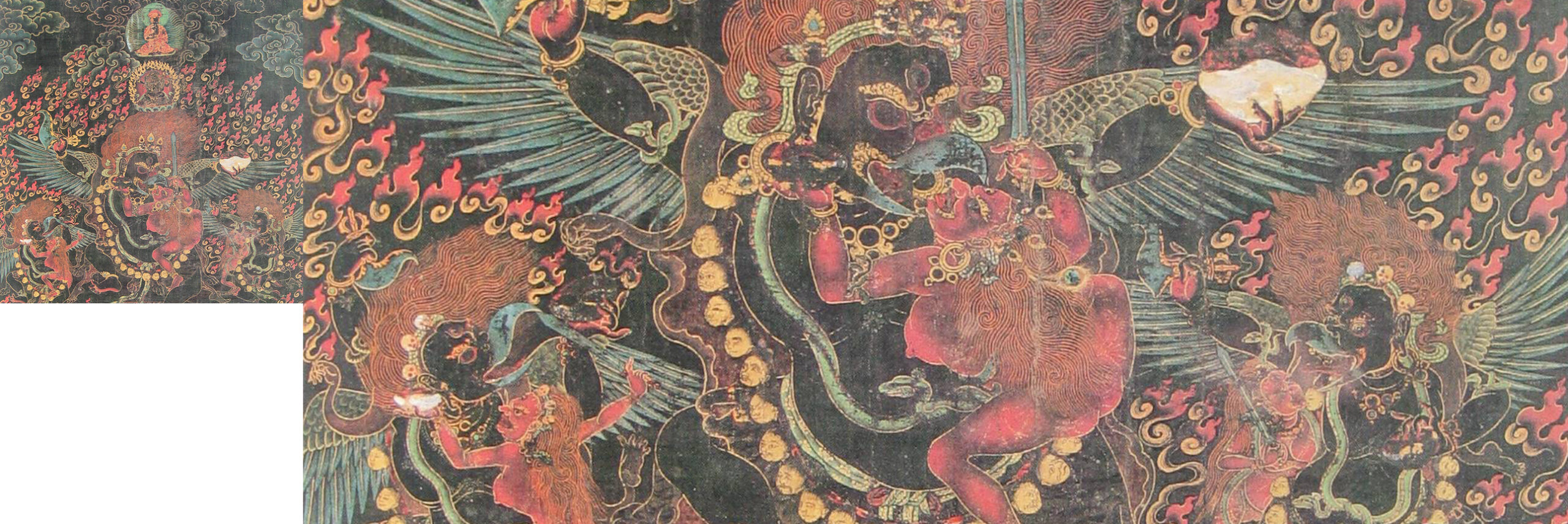
Tibetan Buddhism and Political Power in the Courts of Asia
Academic Conference
April 5–6, 2019
6:00 PM–5:30 PM
This international conference will examine Tibetan Buddhism’s dynamic political role in history as a major catalyst in moving the religion beyond Tibet’s borders to its Tangut, Mongol, Chinese, and Manchu neighbors.
This conference will bring together scholars from multiple disciplines, featuring Tsering Shakya (University of British Columbia) as the keynote speaker, and with panels on Political Legitimacy and the Birth/Spread of Empires; Militant Lamas and Magical Warfare; and Systems of Power and Control of Knowledge.
The conference is held in conjunction with the exhibition Faith and Empire: Art and Politics in Tibetan Buddhism, on view February 1 through July 15, 2019. We will kick off the conference with a reception and tour of the exhibition on Friday, April 5.
Footage of the full conference can be viewed here.
Presented with Columbia University.
Schedule
Friday, April 5, 2019 | 6:00—7:30 PM
Reception and Tour
Reception during K2 Friday Night and tours of the exhibition Faith and Empire
Saturday, April 6, 2019 | 9:00 AM”“5:30 PM
Registration | 9:00 AM
Keynote Address
Tsering Shakya (University of British Columbia) “Yellow Hats and Golden Countenances, Tibetan Buddhism and Empire”
Session 1: Political Legitimacy and Birth/Spread of Empires
Gendun Tenpa (Dargye Museum, Chengdu) “Tsongkha Kingdom as Mediator between the Tibetan Empire and Tangut Xixia”
Kurtis Schaefer (University of Virginia) “Scripture, Politics, and War in the Age of the Fifth Dalai Lama”
Nancy Lin (UC Berkeley) “Two Models of Lay Buddhist Kingship at the Court of Miwang Polhané”
Wen-shing Chou (Hunter College) “Visualizing Emperor as Guru: Kingship and Devotion in Qing-Dynasty China”
Respondent: Chris Atwood (University of Pennsylvania)
Session 2: Militant Lamas and Magical Warfare
Bryan J. Cuevas (Florida State University) “The Politics of Magical Warfare”
Carl Yamamoto (Towson University, MD) “Vanquishing the Enemies of the Teachings: Tantra and Warfare According to Zhang Tselpa”
Karma Phuntsho (Loden Foundation, Bhutan): “MahÄkÄla and Magic in the Making of Bhutan”
Respondent: Karl Debreczeny (Rubin Museum of Art)
Session 3: Systems of Power and Control of Knowledge
Eveline Washul (Columbia University) “The Three Chol kha of Tibet: Sakya Narratives of Power after the Mongol Yuan”
William Dewey (Rubin Museum of Art) “Tibetan Dynastic Politics and the Making of Taranatha’s History of Indian Buddhism”
Lan Wu (Mount Holyoke College) “Paths to Knowledge: Beijing’s Yonghegong and Qing Mongolian Buddhists in the Eighteenth Century”
Riga Shakya (Columbia University) “Entangled Objects: Gift, Reciprocity and the Making of the Imperial Subject in 18th-Century Tibet”
Respondent: Gray Tuttle (Columbia University)
Concluding Remarks
Patricia Berger (UC Berkeley)
The exhibition, catalog, and conference for Faith and Empire are made possible by Fred Eychaner, Ann and Matt Nimetz, Zhou Yu Quan, the Zhiguan Museum of Art, the Ellen Bayard Weedon Foundation, the E. Rhodes & Leona B. Carpenter Foundation, Lisina M. Hoch, Christopher Fussner, the Thomas and Frances Blakemore Foundation, the Neil Kreitman Foundation, Yury Khokhlov, Margot and Tom Pritzker, Carlton Rochell and Kathleen Kalista, and John Eskenazi. The conference for Faith and Empire is co-organized by the Rubin Museum of Art and Columbia University and supported by the Monimos Foundation and the Weatherhead East Asian Institute Workshop and Conference Program Fund for 2018-2019.

